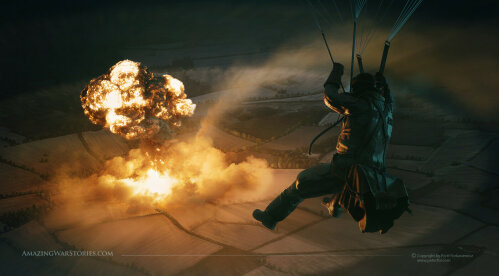WW2 French Bank Notes & Operation Biting Planning Boards
In the dead of night on February 27, 1942, a group of daring British soldiers from the newly formed Parachute Regiment, led by Major John Frost, landed behind enemy lines into German-occupied France. Their mission was to raid a German radar installation in the small coastal village of Bruneval, near the port of Le Havre. This top-secret operation, codenamed Operation Biting, would prove to be one of the most daring and successful raids of World War II.
The mission was part of a larger British plan to gather intelligence on the German radar system, which was critical to the success of the Luftwaffe’s bombing campaigns over Britain. The German radar system was a closely guarded secret, and the British had been searching for a way to obtain valuable intelligence on it for some time.
The Bruneval radar station was one of the few stations to have a new type of radar, known as the Würzburg radar, which the British desperately wanted to study. However, the station was located in a heavily defended area, and a direct assault on it would have been suicidal. If you want to listen on how the raid went, please click on the link to our podcast “The Night Raiders of Normandy” below.
Planning was crucial to the raid’s success and to that end highly intricate and detailed models were built of the objective so that Frost and his men could work out their precise orders. These boards have survived to this day and are now recognised at ‘items of national importance’. On display are also two French Franc bank notes that survived from the raid. Each soldier was given a some cash in the local currency that the operation was to be executed in to use in the event of being trapped behind enemy lines. At the time France used ‘Francs’ as its National currency rather than todays ‘Euros’. Upon the successful return from the mission, Frost and some of the men involved in the raid signed these bank notes.
All of these artefacts and many more can be seen at the Airborne Assault Museum in Duxford – it’s well worth the pilgrimage as it’s one of the finest small military museums in Britain.











